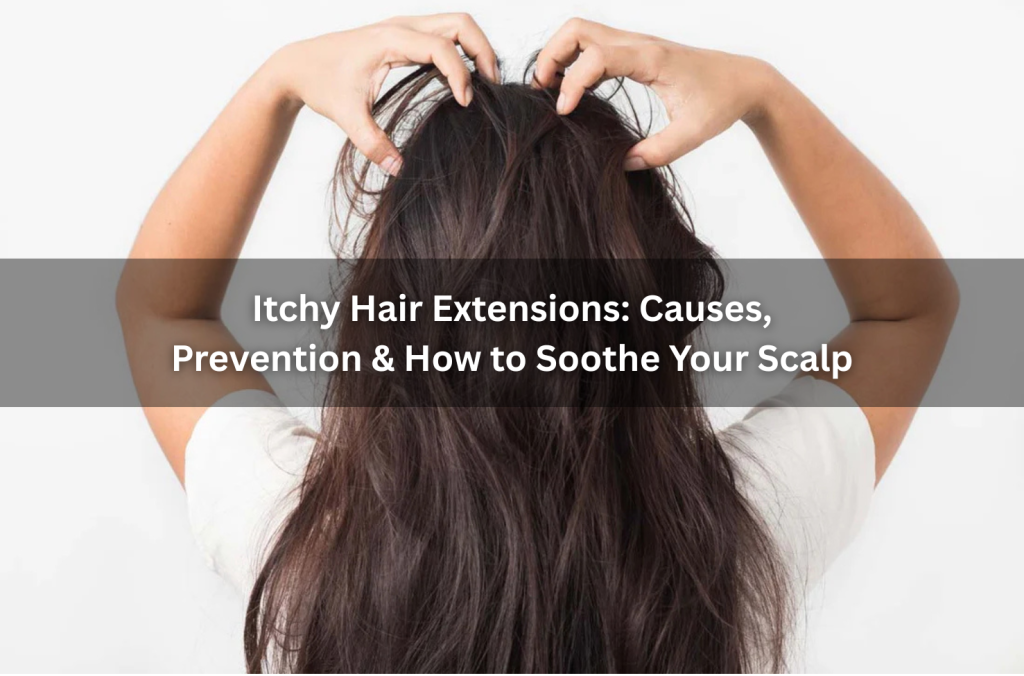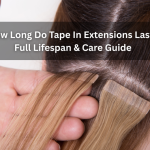Hair Knowledge
Itchy Hair Extensions: Causes, Prevention & How to Soothe Your Scalp
Hair extensions are a fantastic way to achieve fuller, longer hair instantly—but what happens when they start to itch? Itchy hair extensions are a common issue that many users experience, especially in the first few days after installation. In this guide, we’ll explore the causes behind an itchy scalp, how to prevent discomfort, and the best ways to soothe irritation while still enjoying your extensions.
1. Why Do Hair Extensions Make Your Scalp Itch?
While hair extensions themselves are not harmful, they can cause discomfort when certain factors are at play. Let’s break down the most common causes of itchy hair extensions:
- Product Buildup: Hair sprays, dry shampoos, gels, and conditioners can accumulate at the root of the extensions. This buildup clogs hair follicles, leading to irritation and itchiness.
- Tight Installation: If your extensions are applied too tightly—especially in methods like sew-ins, micro links, or keratin bonds—your scalp may feel strained. This excessive tension can cause itching or even headaches.
- Allergic Reaction: Some people may be allergic to adhesives, tapes, or synthetic materials used in their hair extensions. This sensitivity can cause itching, redness, or rashes shortly after installation.
- Poor Scalp Hygiene: If you’re afraid to wash your hair after getting extensions, think again. Sweat, oil, and dead skin cells can quickly build up, creating the perfect environment for itchiness.
- Dry Scalp or Dandruff: Existing scalp conditions like dryness or dandruff can worsen when extensions are added, especially if access to the scalp becomes limited.
- Synthetic Hair Irritation: Not all extensions are made equal. Lower-quality or synthetic hair may contain chemical coatings that irritate sensitive skin.
2. How to Prevent Itchy Hair Extensions
Preventing itchy hair extensions begins before installation and continues through daily care. Here are key steps you can take:
✅ Choose High-Quality Hair Extensions: Look for 100% human hair extensions from trusted suppliers. These are less likely to contain harsh chemicals and feel more natural on the scalp.
✅ Get a Professional Installation: Always visit a trained stylist who understands tension, placement, and scalp health. Proper installation can prevent unnecessary strain and discomfort.
✅ Wash Regularly: Clean your scalp with a gentle, sulfate-free shampoo. Focus on the roots and avoid letting product accumulate around the bonds or clips.
✅ Use Lightweight Products: Avoid heavy creams and oils near the roots. Stick to lightweight, leave-in conditioners and serums that won’t clog the scalp.
✅ Do a Patch Test: If you’re trying a new adhesive or type of hair, test it on a small patch of skin 24–48 hours before installation to check for allergic reactions.
3. How to Relieve an Itchy Scalp with Hair Extensions
Already feeling uncomfortable? Don’t worry—there are ways to calm the itch without removing your hair extensions:
-
Apple Cider Vinegar Rinse: ACV has natural antibacterial properties and helps restore the scalp’s pH. Mix one part ACV with three parts water and rinse gently.
-
Scalp Sprays: Try a soothing tea tree or peppermint scalp spray to cool irritation and reduce inflammation.
-
Massage Gently: Use your fingertips (not nails) to massage the scalp. This helps boost circulation and relieve tension.
-
Avoid Scratching: Scratching can damage both your scalp and the attachment points of your extensions. Instead, try a soft bristle brush to gently stimulate the area.
4. When to See a Professional
If your itchy hair extensions are causing constant discomfort, or if you notice redness, swelling, or flaking, it’s time to speak to a stylist or dermatologist. You may need to adjust the installation method or remove the extensions temporarily to allow your scalp to heal.
5. Final Thoughts
While hair extensions can dramatically transform your look, they shouldn’t come at the cost of comfort. By choosing high-quality products, practicing good hygiene, and monitoring your scalp’s response, you can enjoy your new length without the itch. And if discomfort persists, don’t hesitate to consult a professional—healthy hair always starts with a healthy scalp.





